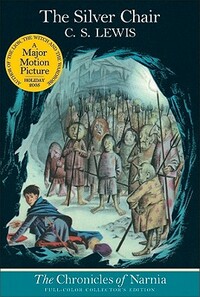Take a photo of a barcode or cover
adventurous
funny
hopeful
inspiring
fast-paced
Plot or Character Driven:
A mix
Strong character development:
Yes
Loveable characters:
Yes
Diverse cast of characters:
N/A
Flaws of characters a main focus:
No
This story is like a Plato primer aimed at kids, and well done at that. Puddleglum is easily one of my favorite Narnians.
Most definitely the weakest of the series so far. It lacked character depth, the pacing was all over the place, and I didn’t find myself caring about anything that happened with the exception of the witch putting them under a spell.
It was also rather frustrating how Lewis tried to play all the plot twists off as shocking, when they couldn’t have been more obvious (‘we’re having you for dinner’ like how could that NOT mean they were going to eat them-)
I guess I liked the ending, and the inclusion of Caspian in Aslan’s country, but that’s all
It was also rather frustrating how Lewis tried to play all the plot twists off as shocking, when they couldn’t have been more obvious (‘we’re having you for dinner’ like how could that NOT mean they were going to eat them-)
I guess I liked the ending, and the inclusion of Caspian in Aslan’s country, but that’s all
adventurous
mysterious
fast-paced
dark
fast-paced
Plot or Character Driven:
Plot
Strong character development:
No
Loveable characters:
No
Diverse cast of characters:
No
Flaws of characters a main focus:
No
All the books in this series are basically the same story, but this one is the weakest so far. The story struggled to keep my interest and the characters didn’t spark anything either.
adventurous
emotional
funny
inspiring
mysterious
tense
medium-paced
Plot or Character Driven:
A mix
Strong character development:
Yes
Loveable characters:
Yes
Diverse cast of characters:
Complicated
Flaws of characters a main focus:
No
it was okay. i wasn't really absorbed in it though. i liked the bit about centaurs eating habits
adventurous
lighthearted
mysterious
fast-paced
Plot or Character Driven:
Plot
Strong character development:
Complicated
Loveable characters:
Yes
Diverse cast of characters:
No
Flaws of characters a main focus:
Yes
This story was sandwiched by even more of Lewis’ fucked up ideas about how children should be raised and a good smattering of sexism.
It definitely was not a promising start with the vilification of co-ed schools (this one being called "Experiment House"):
1. The kids were "allowed to do what they liked", which meant "horrid things, went on" and the kids were never reprimanded (i.e. weren’t beaten up).
2. Onus is put on the fact that "Bibles weren't encouraged" at the school, and also seemingly that women held a lot of the positions of power within the school.
I truly don’t understand why Lewis was SO against children not being abused, let alone treated kindly, and apparently all in the name of God??? He was probably upset they weren't all still in the mines. This is obviously carrying on from the weird precedent of Eustace being evil because he was progressive (not even fucking anti-religious).
Then when we return to the school at the end, when describing the headteacher of "Experiment House" he says:
"And then the Head (who was, by the way, a woman) ..."
SO goddamn sexist in context. The sexism isn’t anywhere near as obvious in Narnia, I assume because I’m used to sexism being more prevalent in this sort of fantasy world, but when we’re back in the real world, just oooof.
However, this same paragraph does also contain pretty accurate commentary on people in power:
"...the Head's friends saw that the Head was no use as a Head, so they got her made an Inspector to interfere with other Heads. And when they found she wasn't much good even at that, they got her into Parliament where she lived happily ever after."
But whether this was Lewis commentating only on women in power, or it expands to everyone in power, I’m not so sure.
Then the whole time in Narnia was really great. Definitely the best ending until this point, and the story is probably the strongest.
Puddleglum was 100% the star of the show; he’s the best bit of character work in the series by far. This was definitely aided by the fact that he’s been the least preachy ‘good’ character, but mainly its that Lewis portrayed him in a very comedic, Pratchett-esque way. A true gem. Also probably helps that I was picturing him as Tom Baker the entire time.
So overall, a largely great read, only let down by Lewis’ crazy views on child rearing at the beginning and end.
adventurous
adventurous
dark
hopeful
sad
fast-paced
Plot or Character Driven:
Plot
Strong character development:
No
Loveable characters:
No
Diverse cast of characters:
Complicated
Flaws of characters a main focus:
No
A really good book with some incredible stories. From the very beginning, it drew me in, but I have to admit—it felt tricky, foggy, and even a bit disorienting at first. I wasn’t sure what to expect or which characters I could trust, which made the story all the more intriguing. This sense of confusion reminded me a lot of how we can feel in life when we lose sight of what’s important or forget the truths we’ve been taught.
What stood out the most to me was how the story serves as a powerful allegory for the Christian life, especially as you grow older. It’s a reminder of what happens when we stray from the path Aslan (or God) has laid out for us and the challenges of staying faithful to His directions. Jill and Eustace’s journey to rescue Prince Rilian is full of moments where they struggle to remember Aslan’s instructions, and their mistakes felt so relatable—they reminded me of how easy it is to get distracted or lose focus in life.
I really loved how the book explores themes of trust, perseverance, and redemption. Puddleglum was such a unique and memorable character; his grounded wisdom and faith in Aslan, even when everything seemed hopeless, really inspired me. The confrontation with the Green Witch in the underworld was especially striking—it felt like a battle between truth and deception, light and darkness.
Overall, The Silver Chair felt deeply meaningful to me. It’s a story that mirrors the struggles and triumphs of faith in a way that’s both challenging and hopeful. It might have started in a fog, but by the end, everything felt clear and purposeful. I really enjoyed it and found it to be one of the most allegorical and thought-provoking books in the Narnia series.
What stood out the most to me was how the story serves as a powerful allegory for the Christian life, especially as you grow older. It’s a reminder of what happens when we stray from the path Aslan (or God) has laid out for us and the challenges of staying faithful to His directions. Jill and Eustace’s journey to rescue Prince Rilian is full of moments where they struggle to remember Aslan’s instructions, and their mistakes felt so relatable—they reminded me of how easy it is to get distracted or lose focus in life.
I really loved how the book explores themes of trust, perseverance, and redemption. Puddleglum was such a unique and memorable character; his grounded wisdom and faith in Aslan, even when everything seemed hopeless, really inspired me. The confrontation with the Green Witch in the underworld was especially striking—it felt like a battle between truth and deception, light and darkness.
Overall, The Silver Chair felt deeply meaningful to me. It’s a story that mirrors the struggles and triumphs of faith in a way that’s both challenging and hopeful. It might have started in a fog, but by the end, everything felt clear and purposeful. I really enjoyed it and found it to be one of the most allegorical and thought-provoking books in the Narnia series.






